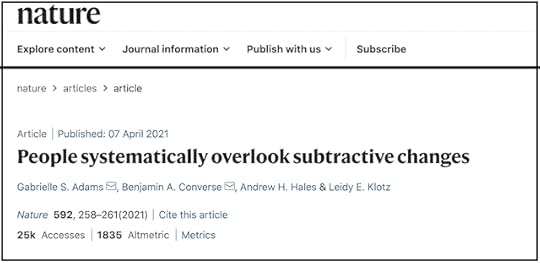
In a paper published last month in the journal Nature (summary), a group of scientists from the University of Virginia reported on a series of experiments designed to assess how we solve problems. When presented with a challenging scenario, humans cannot evaluate every possible solution, so we instead deploy heuristics to prune this search space down to a much smaller number of promising candidates. As this paper demonstrates, when engaged in this pruning, we’re biased toward solutions that add components instead of those that subtract them.
This quirk in our mental processing matters. Potentially a lot. As the authors of the paper conjecture:
“Defaulting to searches for additive changes may be one reason that people struggle to mitigate overburdened schedules, institutional red tape, and damaging effects on the planet.”
As I read about this finding, I couldn’t help but also think about the epidemic of chronic overload that currently afflicts so many knowledge workers. The volume of obligations on our proverbial plates — vague projects, off-hand promises, quick calls and small tasks — continues to increase at an alarming rate. There was a time, not that long ago, when the standard response to the query, “How are you?”, was an innocuous “fine”; today, it’s rare to encounter someone who doesn’t instead respond with a weary “busy.”
Does the wiring of our brains play a role in this reality?
I hadn’t thought about this possibility before, but this new paper raises some intriguing possibilities. The collision of knowledge work (a new thing) with the digital age (an even newer thing) disrupted the professional world, making many office jobs more haphazard and improvisational than ever before. Confronted with this novelty, perhaps our brains fell back to a default answer: do more!
Like the subjects in the experiments reported in this recent paper, however, the best solution to these problems might often instead be to do less. You want more out of your employees? Radically reduce their responsibilities, then leave them alone to execute. You want your small business to grow? Focus your attention on a single target, and give yourself the space to do it better.
Clearly brain biases are not the only factor involved in explaining the growth of busyness culture, but it’s a partial explanation that’s worth (if you’ll excuse the pun) keeping in mind.
(Hat tip: Jesse)
The post
Blog first appeared on
Cal Newport.


 newest »
newest »
 newest »
newest »
 As we swim through the 'infodemics' and the ' misinfodemics' on digital platforms, some life boats appear .
As we swim through the 'infodemics' and the ' misinfodemics' on digital platforms, some life boats appear .






Is the cultural bias bad thing?
Cultural bias comes according to my extented cultural bias about this matter from Yuval Noah Harari the collective imagination of people's. And this collective imagination is here that we can cooperate together. This was once true that we all should have pretty much agreed on everything(since countries could not survive without this believe). But I think that in the future collective imaginations will change. No they won't cease to exist, but we will just change them. For example countries like America and Sweden will be destroyed, not because of any war, but because collective believe that there are any "Americans" or "Swedes" will change. You are propably now thinking that: "I'm American and I believe in America". This brings us back to the cultural bias. Cultural bias = collective imagination. The cultural bias is strong in the present, but in due time it will change and some other believe will take hold of it. And then we will bow down to the king of nonsense or some other cultural bias, which seems utopia to us. Just like in the Middle Ages when people thinked that kings have some kind of "blood" that makes them superior to the peasants, so we now think that democracy is superior to dictatorship and every other political model that may yet be discovered(surely there's better one in the future). Indeed I'm proposing something that may already be proposed: "Development of mankind into the future has always been development of the next cultural bias". And we are living in the present cultural bias, which is not correct. In fact the next cultural bias will not be any bit of more correct than this one or the last, but it will be the next present cultural bias(and so everyone will bow down to that cultural bias and think that they have discovered the Holy Grail of their culture).